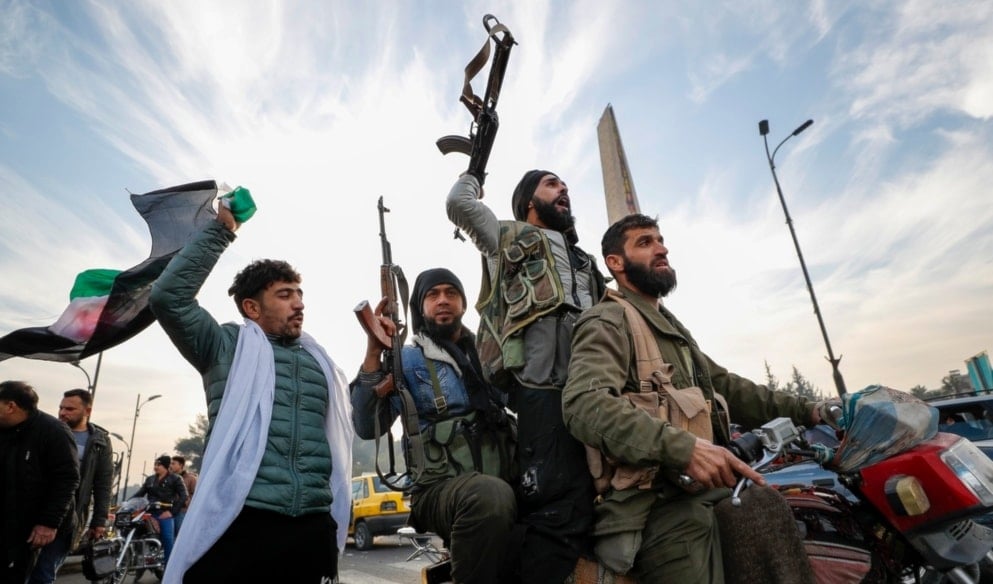Assad’s fall won’t significantly impact the Resistance Axis: Ex-CIA
Former CIA official Paul Pillar argues that the fall of ousted Syrian President Bashar al-Assad won’t be a major setback for the Resistance Axis, emphasizing the challenges of a new regime under HTS and the broader implications for the Middle East.
-

Syrian opposition fighters celebrate after the Syrian government collapsed in Damascus, Syria, on December 8, 2024. (AP)
Former CIA official Paul Pillar, in an article for National Interest, argued that the fall of Bashar al-Assad's regime is not expected to be a major blow to the Resistance Axis. Pillar noted that the Assad family had governed Syria since 1970, and disrupting this long-standing power structure is expected to destabilize the region.
He raised concerns about Hayat Tahrir al-Sham (HTS), labeling it a "radical jihadist" group formerly affiliated with al-Qaeda, still listed as a terrorist organization by the US. Although HTS has tried to present itself as more moderate, Pillar believes this is a strategic move, not a genuine ideological shift. He compared this to the Taliban’s attempts to moderate its stance for international recognition before reverting to its original ideology.
"Despite some efforts to reassure Christians in Syria, the new regime is not likely to become a haven of religious tolerance. Assad headed a regime that favored its Alawite minority but was fundamentally secular and not driven by a religious mission. The same will not be true of the Salafists who control HTS," Pillar said.
Pillar also dismissed the idea that a regime controlled by HTS would be more democratic or tolerant than Assad's secular government, highlighting the continued internal instability due to religious and ethnic divisions. He suggested that Syria’s civil war would persist, much like how ISIS exploited the earlier stages of the war.
On Syria’s relations with Gulf states, Pillar argued that the Gulf’s attempts to distance Assad from Iran have failed. He warned that an Islamic regime in Syria would challenge the legitimacy of monarchies like Saudi Arabia and the UAE.
Pillar noted "For the Saudis and especially the Emiratis, an Islamist regime in their region is anathema because of the basis for legitimacy it offers as an alternative to monarchical rule," adding that "The UAE demonstrated the lengths it would go to oppose such a regime with its military intervention in Libya."
Regarding the Resistance Axis, Pillar asserted that while there would be logistical challenges for Iran and Hezbollah in Syria, the regime change wouldn’t be a major setback for the Axis. He explained that Syria, under Assad, has been "more of a drain than an asset" for Iran, as the alliance had always been one-sided, with aid flowing from Iran to Syria.
Pillar concluded that "the Manichean idea of an Iranian-led axis as the paramount source of the Middle East’s troubles needs to be discarded," as it is inaccurate, stressing that this will become clearer as Syria’s future unfolds.
It is also important to note that Pillar retired from the CIA in 2005 after a 28-year career in the US intelligence community. His final role was as the National Intelligence Officer for the Near East and South Asia. Before that, he held several analytical and managerial positions, including serving as the chief of analytic units at the CIA, focusing on regions such as the Near East, the Persian Gulf, and South Asia.
US, 'Israel' orchestrated Syria crisis, Resistance steadfast: Khamenei
The Leader of the Islamic Revolution in Iran, Sayyed Ali Khamenei, stated on Wednesday that the events in Syria were orchestrated in American and Israeli command centers.
During his speech, Sayyed Khamenei emphasized that Iran has "evidence that leaves no room for doubt" to support this assertion.
He highlighted the role of a "neighboring country," which, according to him, "played an overt role in the events in Syria and continues to do so, as is evident to all," adding that "The primary force behind the conspiracy, the planning, and the command centers was in America and the Zionist entity."
Sayyed Khamenei affirmed that "the power of the Resistance will expand further than ever before, encompassing the entire region."
"The Resistance remains steadfast," he said. "The more pressure it faces, the stronger it becomes. The more crimes committed against it, the greater its legitimacy," Sayyed Khamenei explained.
"The more they fight the Resistance, the broader its front becomes. I assure you, it will grow stronger and encompass the entire region."
He further stressed, "Those who naively think that weakening the Resistance will weaken Iran do not understand what Resistance means. I assure you, Iran is strong and resilient, and it will only grow stronger."
Addressing the occupation of Syrian territories over the past few days, Sayyed Khamenei said, "It is certain that these attackers, each with their own goals, and with objectives that vary from one another, are seeking to occupy land in northern or southern Syria."
Explaining that "the US is trying to establish a foothold in the region; these are their aims," he reasserted that "with time, it will become clear that they will not achieve any of these goals."
Sayyed Khamenei proclaimed, confidently and without doubt, "The patriotic Syrian youth will liberate the occupied areas of Syria, and there is no doubt that this will happen."
In conclusion, once again, Sayyed Khamenei reaffirms the historic position of the Axis of Resistance, stressing that "The US will also fail to establish a foothold, and with God's blessing, strength, and power, the Resistance Front will drive the Americans out of the region."
Read more: US CENTCOM chief tours occupation bases in Syria, meets Iraqi leaders

 5 Min Read
5 Min Read








